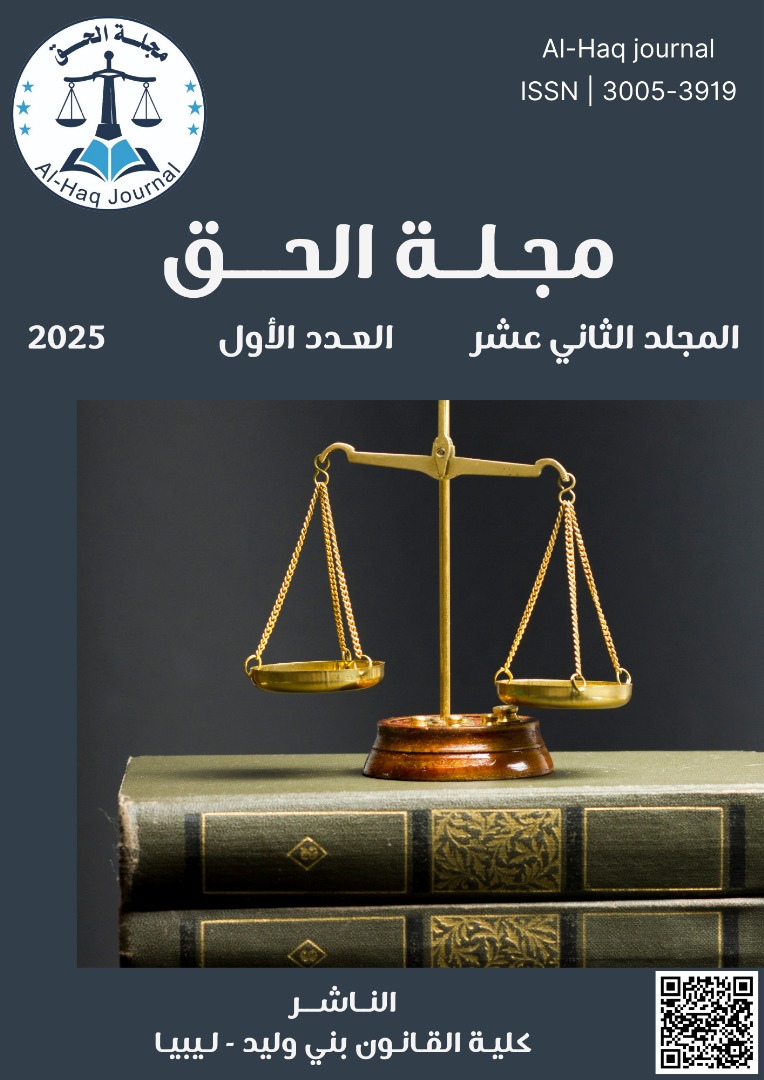The Legal Regime of the Human Genome in International Law
DOI:
https://doi.org/10.58916/alhaq.v12.i1.301Keywords:
Legal system, human genome, international law, sanctity of life, data privacy protectionAbstract
Over the past few years, international and regional declarations have emerged regarding the ethics of human genome modification. Many of the general principles contained in these declarations have been incorporated into the constitutions and national legislation of some countries, either by adopting these declarations as they are, by including certain principles in the country's constitution, or by creating a special law. We find that the constitutional and international principles related to the human genome are not limited to the ethics of dealing with the human genome alone, but rather address broader and more comprehensive constitutional and international principles, such as the right to life, bodily integrity and inviolability, the right to health, human dignity, the right to benefit from scientific progress and its fair use without discrimination among people, the right to diversity and difference, the right to privacy and protection of personal data, and the sanctity of private life. There are some comparative constitutions that address the human genome and their declarations, the position on criminalizing the enhancement of human genetic capabilities, and the position of national and international courts on human genome modification.
Downloads
References
The Holy Quran, Libyan Endowments House, Qalun ʿan Nafiʿ, Fourteenth Edition, 2017
First - Books:
The Holy Quran, Qalun ʿan Nafiʿ.
A) Arabic Books:
Jalil Mustafa Abdullah, The Right to Genetic Privacy and Its Impact on Legal Liability, Dar Al-Jamiʿa Al-Jadida, Alexandria, 2018.
Abdel Aziz Huda, Genetic Rights between Legal Regulation and Ethical Challenges, National Center for Legal Research, 2023.
Hussam Abdul Amir Khalaf, Sustainable Development and Nuclear Energy: A Dialectical Relationship, Journal of Legal Sciences, College of Law, University of Baghdad, Issue 1, 2019.
A. Zahra Muhammad Umar Al-Jabri, Artificial Intelligence and a Course in the Human Genome, University of Sharjah, College of Sharia and Islamic Studies, UAE, 2020.
Dr. Ben Othman Farida, Artificial Intelligence (A Legal Approach), University of Lounes Ali, Algeria, 2020.
b) Foreign Books:
- Legal Books and Journals
Laurie, G., Genomic Research and Human Rights, Legal and Ethical Issues. Oxford University Press, 2004.
Andorno, R. "The Inviolability of the Human Genome in Light of International Biolaw." International Journal of Law and Psychiatry
- International Reports and Publications:
UNESCO, Universal Declaration on the Human Genome and Human Rights, 1997.
HUGO, Statement on the Principled Conduct of Genetic Research, Research, 2000.
European Group on Ethics in Science and New Technology, Opinion on Genetic Testing in the Workplace, 2003.
Second: Academic Theses and Dissertations.
Al-Sharif, Suad Abdel Rahman, Legal Protection of Genetic Data in Comparative Legislation; Master's Thesis, Cairo University. Faculty of Law, 2021.
Adel Mohamed, "The Human Genome in Light of International Human Rights Law," PhD Thesis, University of Algiers 1, 2022.
Third: Scientific Research and Articles
Ahmed, Sami. "Gene Editing and Legal Liability: An Analytical Study in Light of International Law." Journal of Contemporary Legal Research, Volume 12, Issue 3, 2021, pp. 177–202.
Dr. Muhammad Ali Hassan Al-Tashani, A. Samia Ali Muhammad. (2024). The Basic Ethical Principles of the Human Genome and Related Rights and Freedoms (An Authentic Study). Journal of Bani Walid University for Humanities and Applied Sciences, 80.
Ali, A. S. M. (2019). Provisions regulating trademarks in international agreements. Al-haq Journal for Sharia and Legal Sciences, 57-83.
A. Ourida Abdul-Jawad Saleh. (2024). Violation of the sanctity of privacy through social media. Bani Walid University Journal for Humanities and Applied Sciences, 9(2), 139-153. https://doi.org/10.58916/jhas.v9i2.248
Dr. Muhammad Ali Hassan Al-Tashani, & A. Samia Ali Muhammad. (2024). Basic ethical principles of the human genome and the rights and freedoms related to it (an original study). Bani Walid University Journal for Humanities and Applied Sciences, 9(2), 80-94. https://doi.org/10.58916/jhas.v9i2.242
Al-Rubaie, S. A. Q., & ALTAEB, M. O. (2019). The Legal Regulation of Administrative Control in Libyan Legislation and Comparative Systems. Al-haq Journal for Sharia and Legal Sciences, 20-56.
Nahla Zidane Ali Al-Warfali. (2024). The Right to Privacy in the Digital Age. Al-Haq Journal of Sharia and Legal Sciences, 139-157. https://doi.org/10.58916/alhaq.vi.242
Fourth: International Agreements and Conventions.
- UNESCO Declaration on the Human Genome and Human Rights, 1997.
- Universal Declaration on Human Genetic Data, UNESCO, 2003.
- Convention on Human Rights and Biomedicine, Council of Europe, 1997.
- Foreign Law: 004-800 of August 6, 2009, on Bioethics.
- Foreign Law: Article 14/2007 on Biomedical Research.
- Egyptian Law No. 10 of 2020 on the Regulation of Clinical Medical Research.
Fifth: Websites:
- World Health Organization, Department of Genomics https://who.int, accessed December 17, 2024
- UNESCO, Bioethics and Genomics https://www.unesco.org, accessed December 19, 2024
- European Legislation on Genomics and Biomedicine https://www.eur-lex.europa.eu, accessed January 30, 2025.
- Official website of the Human Genome Organization (HUGO). Accessed April 4, 2025.
- Muhammad Nour, What is Artificial Intelligence? www.alarabłon.com, June 14, 2019.
Downloads
Published
Issue
Section
License

This work is licensed under a Creative Commons Attribution-NonCommercial 4.0 International License.









